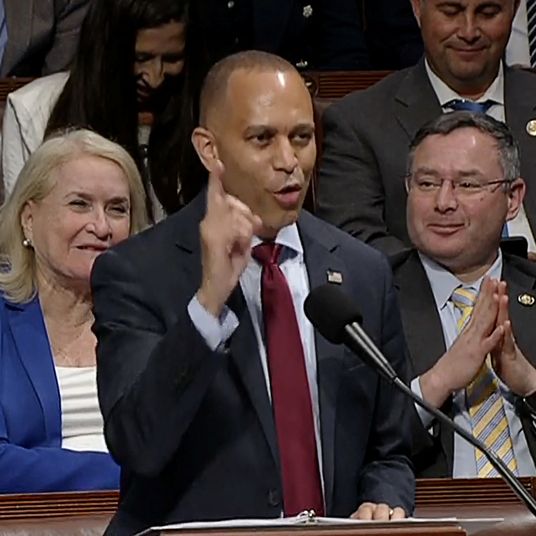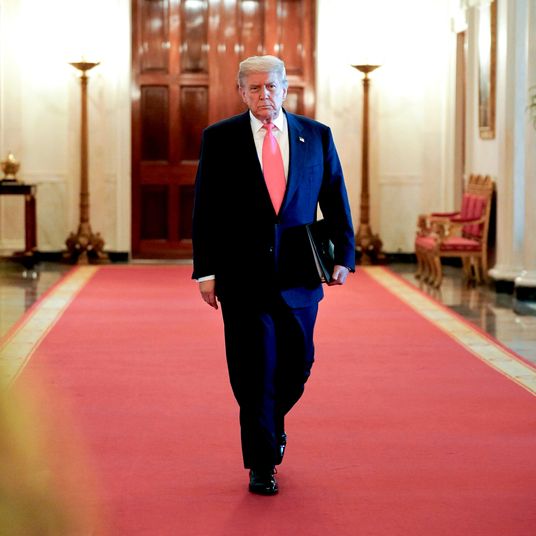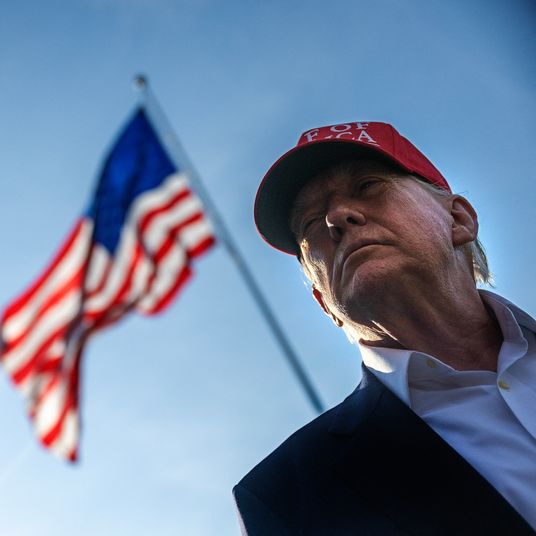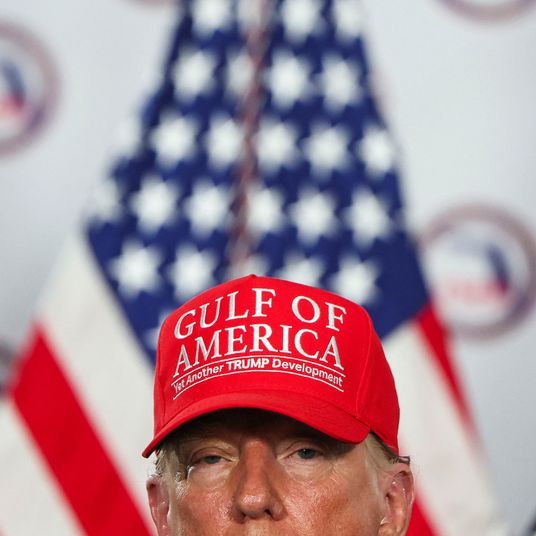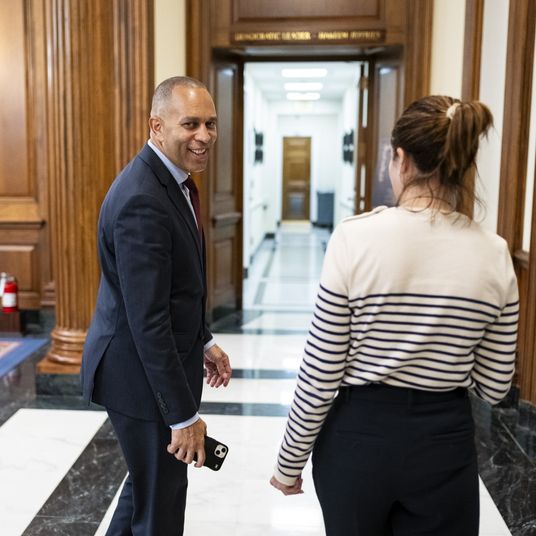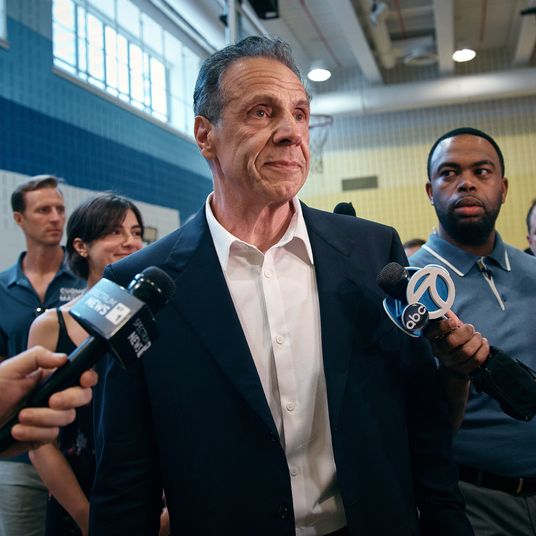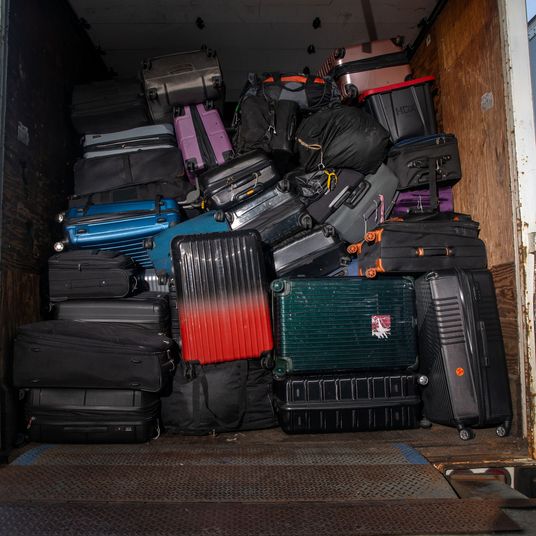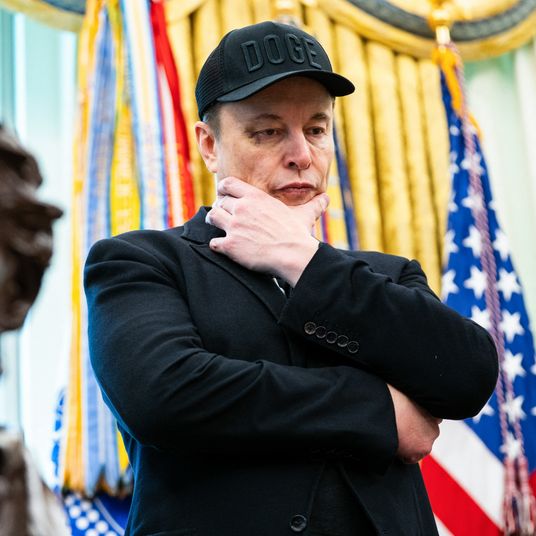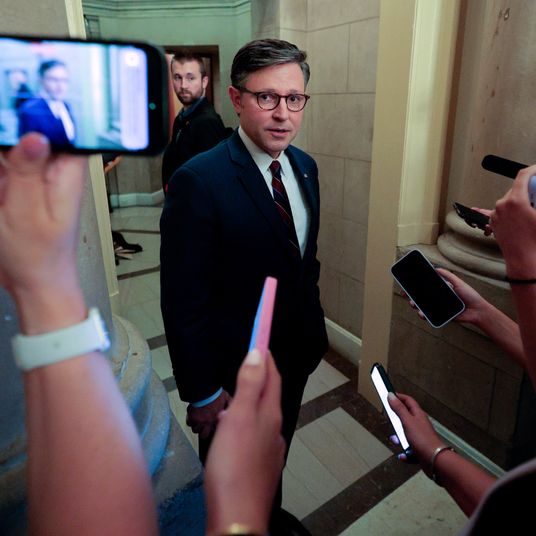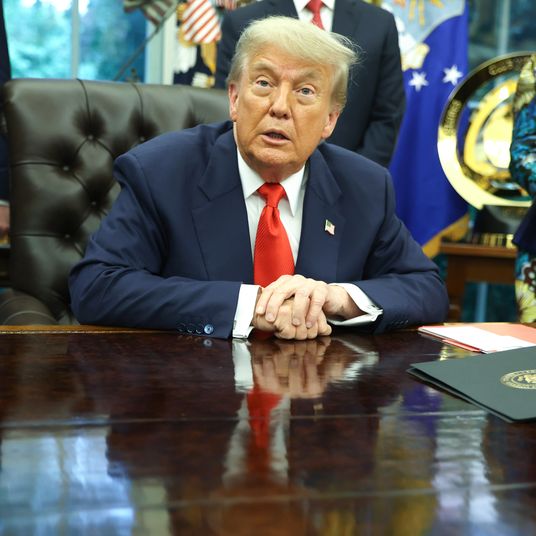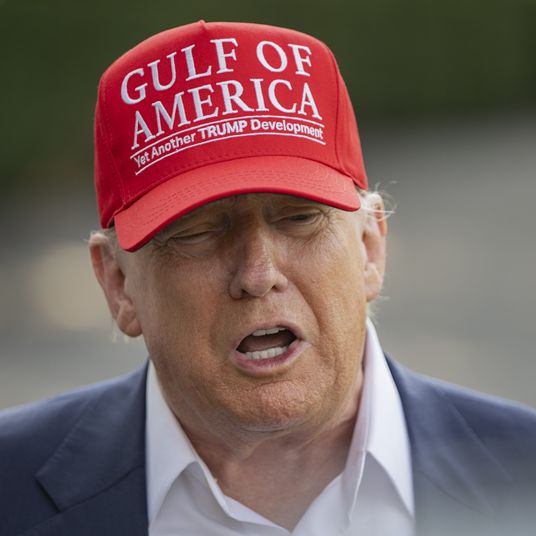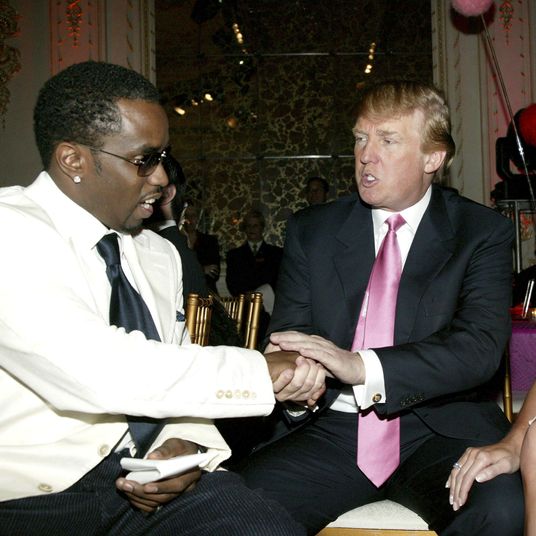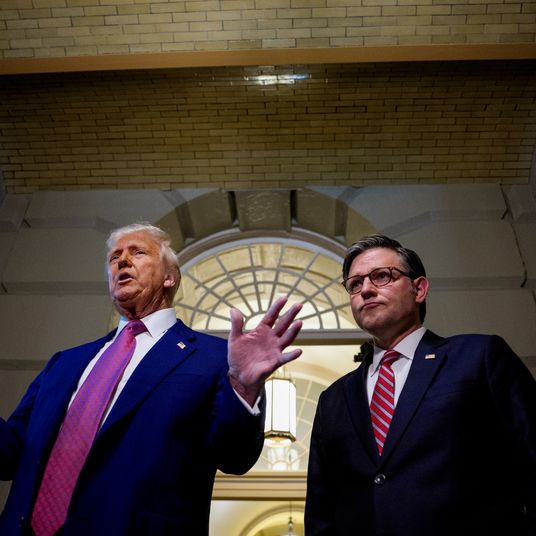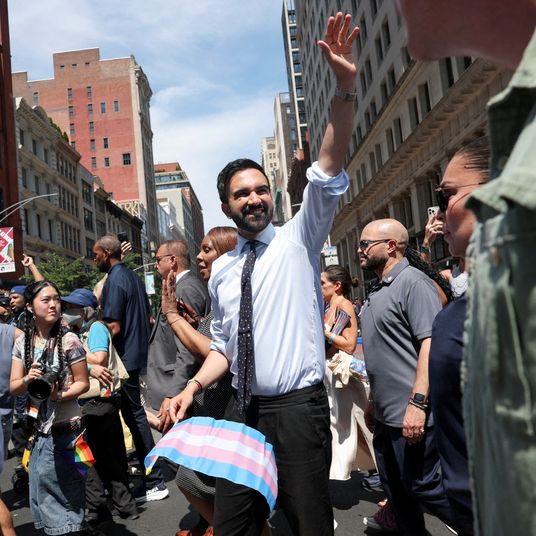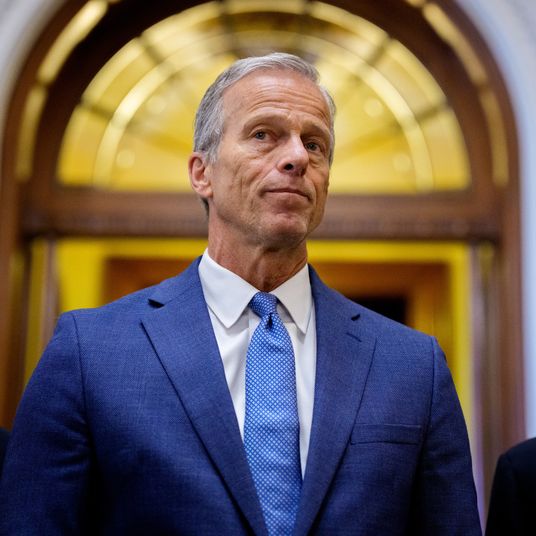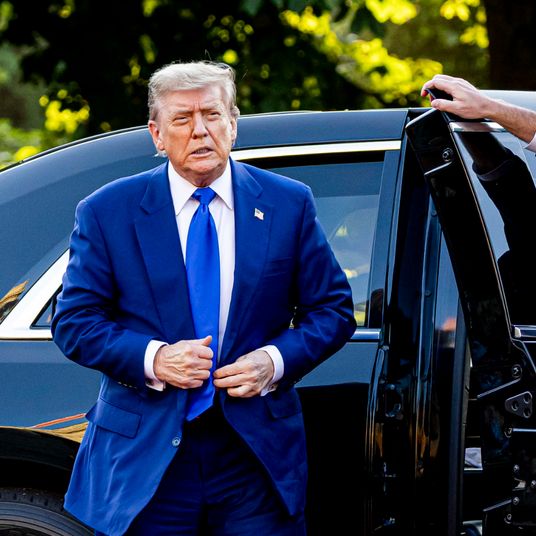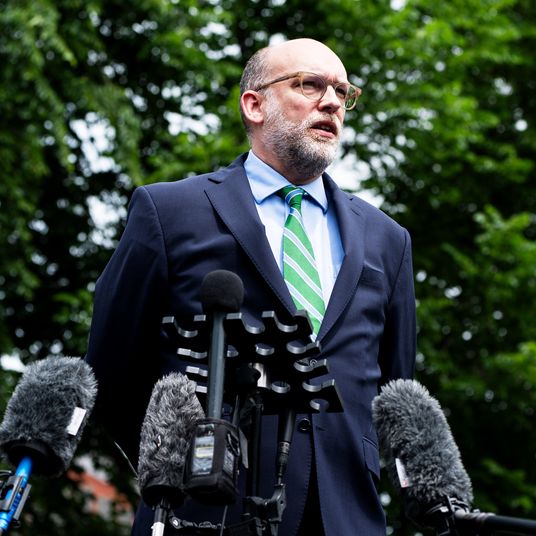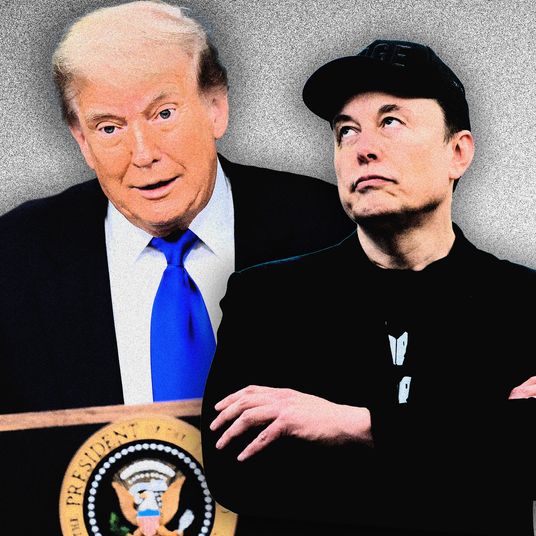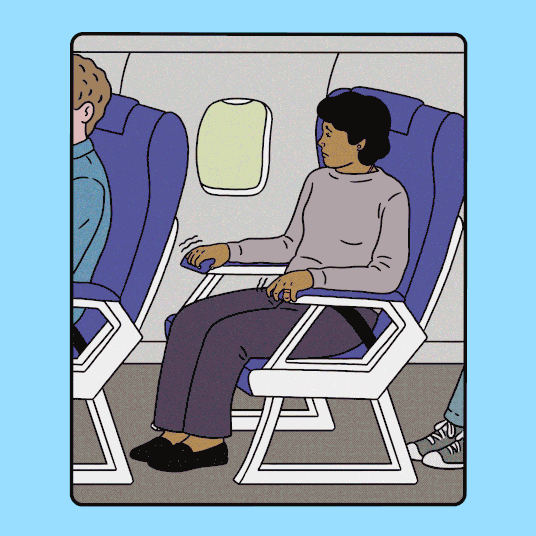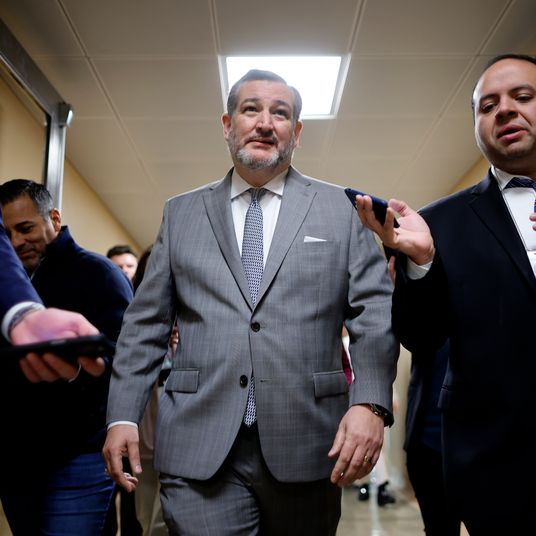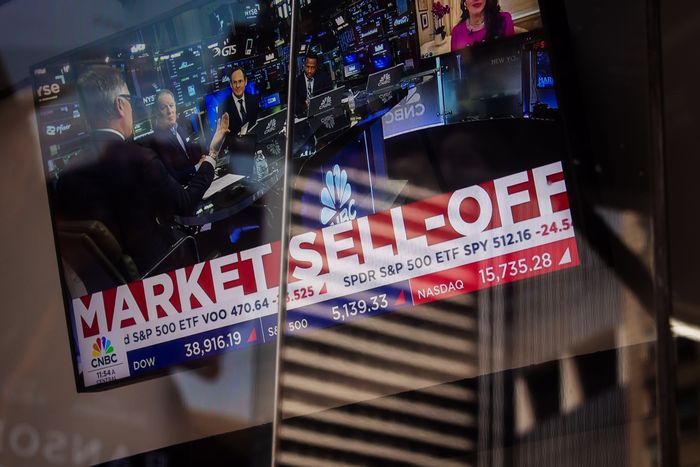
Buckle up. The fallout is well underway after tariff-obsessed President Donald Trump effectively declared a world trade war and announced a long list of new tariffs on countries near and far. The global markets are still absorbing the shockwaves as nearly every economist in the world either scratches their head or pulls out their hair. Below, we’re trying to keep track of the resulting mayhem — both business and political — including analysis and commentary from across the web.
Coverage continues on our new liveblog
Starting with Sunday night’s ominous market indicators. Go here to follow along.
How tariffs will impact one small fashion brand
Per Derek Guy, 3sixteen co-founder Andrew Chen told his Instagram followers yesterday how his company (and their prices) will be affected by Trump’s new tariffs:
New baseline 10 percent tariff starts
It’s April 5, which means the first of Trump sweeping new tariffs — the baseline global tariff of 10 percent — is now in effect.
Trump again insists it’s all going right according to plan
Posted the president on Truth Social this morning:
China has been hit much harder than the USA, not even close. They, and many other nations, have treated us unsustainably badly. We have been the dumb and helpless “whipping post,” but not any longer. We are bringing back jobs and businesses like never before. Already, more than FIVE TRILLION DOLLARS OF INVESTMENT, and rising fast! THIS IS AN ECONOMIC REVOLUTION, AND WE WILL WIN. HANG TOUGH, it won’t be easy, but the end result will be historic. We will, MAKE AMERICA GREAT AGAIN!!!
JPMorgan now expects a recession
On Thursday night, the firm’s economists forecast that there was a 60 percent chance of a global recession. By Friday night, they said they were expecting it, per Bloomberg:
JPMorgan Chase & Co. said it expects the US economy to fall into a recession this year after accounting for the likely impact of tariffs announced this week by the Trump administration.
“We now expect real GDP to contract under the weight of the tariffs, and for the full year (4Q/4Q) we now look for real GDP growth of -0.3%, down from 1.3% previously,” the bank’s chief US economist, Michael Feroli, said Friday in a note to clients, referring to gross domestic product. …
JPMorgan’s forecast came alongside similar changes from other banks, which have been slashing projections for US growth this year since the tariff announcement. On Thursday, Barclays Plc said it expects GDP to contract in 2025, “consistent with a recession.”
A $6.6 trillion two-day rout
That’s how much stock market value got erased on Thursday and Friday. And the S&P 500’s two-day crash was one of the biggest in history, as CNBC’s Michael Santoli explains:
The 10% Thursday-Friday collapse in the S & P 500, taking it 17.4% below its Feb. 19 record high, ranks among the deepest two-day declines in more than 70 years: October 1987 (Black Monday), November 2008 (post-Lehman collapse) and March 2020 (the Covid crash).
The big tech billionaires took it on the chin, too: Elon Musk lost nearly $31 billion, Mark Zuckerberg lost more than $27 billion, and Jeff Bezos lost nearly $23.5 billion. A lot of ultra-rich people lost a lot of money, Bloomberg notes:
The world’s 500 richest people suffered the biggest two-day loss ever on the Bloomberg Billionaires Index as fallout from President Donald Trump’s tariff announcement decimated markets across the globe. Billionaires on the wealth list lost a collective $536 billion from Thursday’s stock market open to Friday’s close as the S&P 500 Index dropped 10.5% over the two days and the Nasdaq Composite fell 11.4%. Friday’s $329 billion drop was the largest since the height of the Covid-19 pandemic in 2020, swamping Thursday’s $208 billion slide. Almost 90% of the billionaires tracked by the wealth index saw their fortunes fall Friday, with an average decline of 3.5%.
Will average Americans become the new smugglers?
David Frum sketches out that scenario at the Atlantic:
In a few days’ time, every desirable consumer good will be dramatically more expensive in the United States than on world markets. Flat-screen TVs, athletic shoes, video-game equipment, even household basics such as coffee, toilet paper, and soy sauce—all will soon cost 20, 25, 35 percent more than they cost on world markets.
Trump has just opened perhaps the greatest arbitrage opportunity in the history of world trade. His effort to repeat the Smoot-Hawley tariffs of the 1930s will also replicate the cross-border bootlegging of alcohol during Prohibition.
From around the world, goods will flow to American black markets. That flow will overwhelm U.S. enforcement capability. Only about 26,000 officers in the Department of Homeland Security are charged with enforcing customs duties at borders, seaports, and airports. Policing flows of fentanyl has been difficult enough. But as abundant as fentanyl is, most Americans don’t buy it: It’s an extremely harmful product, trafficked by some of the world’s most vicious criminals, and most people rightly want nothing to do with it.
But not even the most fervent MAGA supporter will think it harmful to bargain-shop for free-trade underwear out of the back of a truck driven from Mexico or Canada. Nor will it be easy to motivate state and local police to raid the stalls and stands that will soon appear on the streets of American towns, let alone monitor the near-infinite quantity of transactions in online marketplaces such as eBay and Etsy.
How fast will prices go up?
That will very much depend on the product and a multitude of factors. Some experts have said food prices could go up very quickly, while the prices of various consumer electronics could remain stable for at least a short while, the Verge reports:
Some device makers have increased inventory in anticipation of tariffs hitting. [Michigan State University professor of supply chain management Jason] Miller says in the past few months, computer imports were over 70 percent higher than 2023, while cell phone imports in February 2025 were the highest since 2022. Cadwell also says Soundly is working to build reserves and that based on current inventory levels, it’s likely price increases won’t hit the market until fall. However, that’s not a guarantee that this is true for every single device maker and every gadget category.
”Vendors/channels have been stretching existing inventory as much as they can to avoid price increases, but close deadlines announced yesterday for tariff increases significantly ramp up the pressure. I’d be surprised if even the best positioned brands in terms of inventory are able to stretch two to three weeks beyond the new tariff deadlines,” says [IDC’s Ryan] Reith.
In other words, if you currently have an aging piece of tech that needs replacing, it may be a good idea to do it before inventory runs out.
Also, as the Strategist’s Michael Zhao writes, the price increases will be on the declared values, not retail prices:
Tariffs are calculated on the declared value of goods, which only includes the cost of manufacturing and shipping and is much lower than the retail price we encounter in stores. For example, a pair of Vietnamese-produced Nike runners sells for $140, but that includes a retail markup of 40 to 60 percent, so its declared cost is probably closer to $70. A tariff of 46 percent on $70 is $32.20, meaning that same shoe will likely cost closer to $170 if the majority of the cost increases are passed onto customers.
Smaller purchases will get more expensive, but not by enough to warrant rushing to buy things you wouldn’t otherwise need. However, if you’ve been saving up for something large and expensive that can’t be produced domestically, now is the time to act.
Another brutal day for the U.S. stock market
Per CNBC after the close:
• The Dow Jones Industrial Average dropped 2,231.07 points, or 5.5%, to 38,314.86 on Friday, its biggest decline since June 2020 during the pandemic. This follows a 1,679 point decline on Thursday and brings the drawdown from its record to more than 14%.
• The S&P 500 nosedived 5.97% to 5,074.08, also the biggest decline since March 2020. The benchmark shed 4.84% on Thursday and is now off more than 17% off its recent high.
• The Nasdaq Composite, home to many tech companies that sell to China and manufacture there as well, dropped 5.8%, to 15,587.79. This follows a nearly 6% drop on Thursday and takes measure down by 22% from its December record, a bear market in Wall Street terminology.
• The selling was broad with only 14 members of the S&P 500 higher on the day. Major market indexes closed at their lows of the session.
Also:
The 10-year Treasury yield fell back below 4% Friday as investors flooded into bonds for safety, pushing prices up and rates lower. The CBOE Volatility index, Wall Street’s fear gauge surged above 40, an extreme level seen only during rapid market declines.
Blame the other guy
Pinning Trump’s economic chaos on Biden has become mini-trend among Trump’s defenders:
Nobody is willing to risk challenging Trump over this madness
It’s not just Congressional Republicans — business officials and lobbyists are keeping quiet too, Politico reports:
Republican lawmakers are signaling they’re willing to tolerate the pain for now, despite the economic fallout back home. Lobbyists, who are quietly prodding the same lawmakers to defend their interests, don’t want to have a target on their back — or their clients’. Even some Trump world confidantes, alarmed about the tariffs’ impact, are hoping someone else intervenes.
“There is zero incentive for any company or brand to be remotely critical of this administration,” said a public affairs operative, who, like others interviewed for this story, was granted anonymity to speak freely. “It destroys your ability to work with the White House and advance your policies, period.”
An official in the energy industry echoed that sense of fear. “Hearing angst and frustration from all quarters,” the official said via text message, “but no one wants to be first out of the box saying anything negative about Trump’s decision-making.” …
“There is absolutely a sense that the administration is keeping a list, and no one on K Street wants to be on it,” said one executive at a trade group downtown.
Wither the dollar?
New York Times reporter Colby Smith highlights an anomaly amid the market downturn:
One of the notable things about the ongoing rout in financial markets is the fact that dollar is also tumbling. That isn’t how it typically works. In bouts of volatility, the dollar tends to do well, serving as a haven for investors. The move also undercuts one of the main arguments that Trump’s economic advisors have long promoted as to why tariffs would not be inflationary. They argued that tariffs would raise the value of the dollar, helping to offset the impact of rising prices. Some strategists say the drop reflects intensifying fears of a U.S. recession because of tariffs. Others say it could reflect something even more pernicious: Investors are starting to question U.S. economic exceptionalism.
No, the tariffs weren’t part of carefully thought out plan
The Washington Post reports that Trump is just doing whatever he wants:
After weeks of work, aides from several government agencies produced a menu of options meant to account for a wide range of trading practices, according to three people familiar with the matter. Instead, Trump personally selected a formula that was based on two simple variables — the trade deficit with each country and the total value of its U.S. exports, said two of the people, who spoke on the condition of anonymity to recount internal talks. While precisely who proposed that option remains unclear, it bears some striking similarities to a methodology published by Peter Navarro, Trump’s hard-charging economic adviser, during his first administration …
After deliberations that went late into Tuesday night, Trump didn’t decide on the final plan until around 1 p.m. Wednesday — less than three hours ahead of his Rose Garden announcement.
Inside and outside the White House, advisers say Trump is unbowed even as the world reels from the biggest increase in trade hostilities in a century. They say Trump is unperturbed by negative headlines or criticism from foreign leaders. He is determined to listen to a single voice — his own — to secure what he views as his political legacy.
“He’s at the peak of just not giving a f— anymore,” said a White House official with knowledge of Trump’s thinking.
Newsom says California will try to do its own international trade?
This seems to be little more than posturing:
Powell warns that tariffs will trigger higher inflation
Reports CNN:
Inflation is likely to pick up because of President Donald Trump’s sweeping tariffs, and could remain elevated, Federal Reserve Chair Jerome Powell said Friday.
“We face a highly uncertain outlook with elevated risks of both higher unemployment and higher inflation,” he said in prepared remarks at an event just outside Washington, DC. “While tariffs are highly likely to generate at least a temporary rise in inflation, it is also possible that the effects could be more persistent.”
Shortly before Powell spoke, Trump tried to goad him into cutting interest rates in a Truth Social post:
This would be a PERFECT time for Fed Chairman Jerome Powell to cut Interest Rates. He is always “late,” but he could now change his image, and quickly. Energy prices are down, Interest Rates are down, Inflation is down, even Eggs are down 69%, and Jobs are UP, all within two months - A BIG WIN for America. CUT INTEREST RATES, JEROME, AND STOP PLAYING POLITICS!
Powell is holding off any rate changes. “We are well positioned to wait for greater clarity before considering any adjustments to our policy stance,” the Fed chairman said. “It is too soon to say what will be the appropriate path for monetary policy.”
Nintendo delays Switch 2 pre-orders
Nintendo fans will have to wait to secure the long-awaited console, as the company has announced that
pre-orders for Nintendo Switch 2 in the U.S. will not start April 9, 2025 in order to assess the potential impact of tariffs and evolving market conditions. Nintendo will update timing at a later date. The launch date of June 5, 2025 is unchanged.
Trump is already sliding in polls, and tariffs probably won’t help
It will take at least a few more days until we get some sense of what Americans think of Trump’s newest tariff plans (and the chaos they have caused). As I wrote yesterday, polls have shown he is hardly on solid ground regarding the economy up to now:
At a more general level than tariffs or trade policies, Trump’s job-performance ratings for handling the economy — by general assent the most important issue in 2024 — have been mediocre with ratings on prices and inflation coming in significantly lower. An April 1 Economist-YouGov survey showed a 45 percent to 48 percent approval ratio on Trump’s handling of “jobs and the economy,” which slipped to 40 percent to 53 percent on “inflation/prices.” A March 11 NBC News poll gave Trump a 44 percent approval to 54 percent disapproval job performance rating on “the economy” and a 42 percent approval to 55 percent disapproval rating on “inflation and the cost of living.” Most impressively, a March 31 CBS News survey showed 64 percent of Americans thought Trump’s focus on lowering prices was “not enough.”
Read the rest, including the pre-“Liberation Day” polling on Trump’s tariffs, here.
NASDAQ goes bear
The NASDAQ Composite index is now in bear-market territory, having dropped another 3 percent on Friday, putting it more than 20 percent below it last peak in mid-December.
Why nobody could have expected this
I spoke with Wedbush Securities’ Dan Ives and asked him why the financial world is so shocked when Trump is doing something he repeatedly said he was going to do:
One thing that has puzzled me is that Trump has been warning about doing this for months. And he’s had these firm beliefs about tariffs since the ’80s. In his first term, the tariffs weren’t so dramatic, but now he’s only surrounded by sycophants, not people like Gary Cohn. So could everyone be so shocked about this? The markets supposedly had it priced in, but it turns out they didn’t.
But remember, this is worse than the worst-case scenario. No one ever thought in the nightmare of nightmare scenarios that he’d come out with calculations out of a sci-fi movie. If it had come out as like-for-like, as reciprocal, that would be a starting point. When you come out with China at 68 percent, Taiwan at 64 percent — I mean, those numbers are wrong. And investors don’t even know where to start. It would be like a house selling for $500,000 and you bid $2,000.
So in other words, it’s somewhat defensible that the market didn’t build this in, because it was so unimaginable.
Reciprocal tariffs, baseline tariffs, hard-line stands — the market understood that. But the numbers, they’re basically created out of thin air to build a narrative. That’s the problem.
Read the rest of the interview here.
U.S. markets fall following China’s retaliation
Tech stocks led the way again, as CNBC reports:
The stock market took another pounding Friday after China retaliated with new tariffs on U.S. goods, raising fears a trade war will tip the globe into a recession. The Dow Jones Industrial Average traded 1,130 points, or 2.8%. This follows a 1,679.39 point decline on Thursday. The S&P 500 slid 3.2% after the benchmark shed 4.84% on Thursday. The Nasdaq Composite shed 3.5% as many tech companies have exposure to China. On Thursday, the Nasdaq tumbled 6% …
Companies with large exposure to China led declines with Apple and Qualcomm down 3% each. Tesla lost 3%, and Caterpillar shed 6%. Nvidia fell 3%. Bank stocks tumbled in the premarket as worries of a U.S. economic slowdown grew. Morgan Stanley dropped 6%, while Goldman Sachs shed 5.5%. Citigroup and JPMorgan Chase slid 6.6% and 5.1%, respectively, while Wells Fargo dipped 5%.
Trump is posting through it: tells investors he won’t change his polices, says China is losing his game
This morning on Truth Social, shortly before the markets opened: “TO THE MANY INVESTORS COMING INTO THE UNITED STATES AND INVESTING MASSIVE AMOUNTS OF MONEY, MY POLICIES WILL NEVER CHANGE. THIS IS A GREAT TIME TO GET RICH, RICHER THAN EVER BEFORE!!!”
That was right after he retweeted a few videos calling him a negotiation genius, including this:
Then he claimed credit for the better-than-expected jobs report on Friday.
Then Trump ridiculed China following its retaliation:
Don’t expect a GOP intervention anytime soon
Politico captures the general wait-and-see attitude of Republicans in Congress, who are clearly more afraid of Trump than they are of economic ruin:
“I think most members on our side are very willing to give the president time,” Arkansas Sen. John Boozman said, summing up the view of many GOP lawmakers who might have qualms about Trump’s massive new levies but showed little interest — at least for now and the near future — in doing anything concrete to restrain him.
On the one hand, it was the latest example of how timid Republican lawmakers have grown in checking or challenging Trump, who has remade the GOP in his own image over the course of a decade. On the other, some hints of possible future pushback emerged — four GOP senators voted with Democrats Wednesday to overturn an earlier, smaller tranche of tariffs, and a veteran Republican senator proposed curtailing presidential powers to levy tariffs.
But in interview after interview Thursday, as the markets sunk deeper and deeper, senators made clear they would not be sticking their necks out on the issue.
China retaliates in kind
China’s finance ministry said Friday it will impose a retaliatory tariff on U.S. goods matching Trump’s tariffs on it, though the tariff won’t affect anywhere near as many goods as Trump’s does because of the trade imbalance between the two countries. China didn’t just target U.S. businesses with a new tariff, however. Per the New York Times:
Separately, China’s Ministry of Commerce said it was adding 11 American companies to its list of “unreliable entities,” essentially barring them from doing business in China or with Chinese companies. The ministry imposed a licensing system to restrict exports of seven rare earth elements that are mined and processed almost exclusively in China and are used in everything from electric cars to smart bombs.
The commerce ministry also announced it was beginning two trade investigations into American exports of medical imaging equipment — one of the few manufacturing categories in which the United States remains internationally competitive.
China’s General Administration of Customs said that it would halt chicken imports from five of America’s biggest exporters of agricultural commodities and sorghum imports from a sixth company.
And China’s State Administration for Market Regulation announced that it suspected the China division of DuPont, the American chemicals giant, had violated China’s antimonopoly law and would investigate. DuPont had no immediate comment.
Penguins can blame erroneous trade data for Trump’s terrible tariff aim
The Guardian figured out how very remote Australian islands ended up on the Trump administration’s new tariff list:
The data relates, at least in part, to shipments mislabelled as coming from remote Norfolk Island, or Heard Island and McDonald Islands, instead of their correct countries of origin, the Guardian can reveal. Among the erroneously labelled shipments over the past five years from the island territories are shipments of aquarium systems, Timberland boots, wine and parts for a recycling plant. According to an analysis of US import data and shipping records, multiple shipments of goods were classified as having originated from Norfolk Island or Heard and McDonald islands when neither the company address, nor the port of departure for the shipment, nor the destination port were located in those territories.
The Guardian did not figure out why the Trump administration’s trade-war planners were apparently unable to confirm there were businesses (or people) in all the places they targeted.
JPMorgan analysts: Recession risk now 60 percent
The firm’s economists warned clients in a research note on Thursday that the risk of a global recession has gone up to 60 percent, assuming Trump’s new trade policies are sustained. In their analysis, the new tariffs will likely amount to “the largest tax hike since WWII” for Americans.
“There will be blood,” wrote the firm’s chief economist.
Will countries retaliate against the U.S., and if so, how many?
So far, most of the countries hit with the new tariffs are mainly just speaking out against them, and only a handful of countries have indicated they will or may strike back. China has vowed to retaliate. The U.K. is making a list of U.S. goods it could impose its own tariffs on. French president Emmanuel Macron has called for the E.U. to suspend investment in the U.S, and Brazilian president Luiz Inácio Lula da Silva vowed that Brazil “will take all appropriate measures to defend our companies and our workers.”
Trump contradicts his aides, says he is open to negotiation
Shortly after Trump’s top aides tried to convince everyone that the new tariffs were not a negotiating tactic, the president gave reporters some whiplash aboard Air Force One:
Every country is calling us. That’s the beauty of what we do. We put ourselves in the driver’s seat. If we would have asked these countries to do us a favor, they would have said no. Now they will do anything for us … The tariffs give us great power to negotiate. They always have.
It’s the uncertainty, stupid
Politico economics correspondent Victoria Guida points out that CEOs can’t give Trump what he wants if they don’t understand what he’s doing:
It’s not that tariffs can’t work as an action-forcing tool for companies to move production to the U.S. This is a wealthy country with one of the largest consumer markets in the world, and the president probably isn’t wrong that a lot of our trading partners would capitulate to keep serving it.
But I’ve asked multiple corporate executives in recent weeks whether companies are likely to start investing in manufacturing in the United States in response to Trump’s policies, and the message has basically been: That’s an unanswerable question right now. Because making those decisions requires understanding the relative costs of doing it versus not doing it, and Trump is far too unpredictable to allow for that kind of calculation.
The chaos agent in chief
The Atlantic’s Derek Thompson argues that Trump’s incoherent new tariff plan is not at all out of character:
If the tariffs violate their own internal logic and basic common sense, what are they? Most likely, they represent little more than the all-of-government metastasis of Trump’s personality, which sees grandiosity as a strategy to pull counterparties to the negotiating table and strike deals that benefit Trump’s ego or wallet. This personality style is clear, and it has been clearly stated, even if its application to geopolitics is confounding to observe.
“My style of deal-making is pretty simple and straightforward,” Trump writes in The Art of the Deal. “I aim very high, and then I just keep pushing and pushing and pushing to get what I’m after. Sometimes I settle for less than I sought but in most cases I still end up with what I want.”
One can see this playbook—threat, leverage, concession, repeat—playing out across all of society. It’s happening in trade. It’s happening in law. It’s happening in academia. In the first two months of his second term, Trump has already squeezed enormous concessions out of white-shoe law firms and major universities. Trump appears to care more about the process of gaining leverage over others—including other countries—than he does about any particular effective tariff rate. The endgame here is that there is no endgame, only the infinite game of power and leverage.
The White House tariff talking points
The Washington Post got ahold of them. The White House doesn’t want allies suggesting the new tariffs are a negotiating tactic:
As the world tries to make sense of Trump’s sprawling new import taxes, the administration’s internal instructions say advisers should characterize the tariffs as a response to a national emergency, rather than the basis for potential trade talks, the people said. In addition to the talking points, Trump himself has told advisers the tariffs are not about setting up negotiations, two of the people said. The people spoke on the condition of anonymity to describe private conversations.
The internal guidance, previously unreported, comes as stock markets worldwide slump on fears of an escalating trade war. On Wednesday, Trump announced a 10 percent tariff that would apply to imports from every country, and a separate set of what he called “reciprocal” tariffs that impose a higher country-specific rate. While most analysts expect the 10 percent tariff to remain in place for the rest of Trump’s term, there has been substantial uncertainty about the purpose of the country-specific tariffs, which imposed import duties from 11 percent to 50 percent on dozens of countries.
A historically brutal day for U.S. financial markets
A closing summary from the The Wall Street Journal:
U.S. markets slid Thursday in their steepest declines since 2020, as investors grappled with the threat that President Trump’s new tariff plan will trigger global retaliation and hurt the economy. Major stock indexes dropped as much as 6%. Stocks have lost roughly $3.1 trillion in market value Thursday, their largest decline since March 2020. The Dow industrials dropped 1679 points, or 4%. The tech-heavy Nasdaq, which powered the market higher for years, was down 6%, pulled lower by big declines in Nvidia, Apple and Amazon.com. The S&P 500, which fell 4.8%, and the other benchmarks, suffered their sharpest declines since the early days of the Covid-19 pandemic. The dollar meanwhile slipped to its lowest level of the year, a sign of unease over the growth outlook and fears that the flow of international funds into the country will be sharply curtailed. Inflation expectations rose.
Trump thinks ‘it’s going very well’
Trump told reporters on Thursday afternoon that it was all fine: “The markets are gonna boom, the stock is gonna boom, the country is gonna boom. And the rest of the world wants to see, is there any way they can make a deal.”
Grassley pushes back, a little
As Politico reports, the Senate GOP’s No. 3 leader made his displeasure know, in a way:
Sen. Chuck Grassley, a senior Republican lawmaker from the farm-heavy state of Iowa, is spearheading new legislation that would reassert Congress’ authority over tariffs amid President Donald Trump’s trade war escalation. The measure, jointly introduced Thursday with Sen. Maria Cantwell (D-Wash.), would limit the president’s power to impose tariffs. It would require the president to notify Congress within 48 hours of such an imposition and for Congress to explicitly approve any new tariffs within 60 days. The bill also would allow Congress to end any tariff at any time.
It’s highly unlikely this proposal will ever become law. Still, support from Grassley — who chairs the Judiciary Committee, sits on the Finance Committee and is third in line for the presidency as the Senate’s president pro tempore — sends a strong signal about the GOP’s growing unease with Trump’s actions and the party’s willingness to say something about it.
Apple was hit especially hard, and its prices could go way up soon
CNBC notes that Apple is now paying a price for the strategy it adopted to weather the first Trump administration’s China tariffs and the COVID pandemic supply-chain troubles:
In the past few years, Apple has sold Americans iPhones made in India, AirPods from Vietnam and Mac desktops assembled in Malaysia. It was part of a strategy by Apple to diversify its manufacturing from China. …
It seemed like a solid strategy. Until President Donald Trump’s “reciprocal tariffs” this week hit those countries, too. The company’s shares fell over 9% during trading on Thursday versus a 5% decline for the Nasdaq. That wiped out nearly $300 billion in market cap for the iPhone maker. …
To offset the price of the tariffs, Apple may have to raise prices across its product lines by 17% to 18% in the U.S., [Morgan Stanley analyst Erik] Woodring estimates. But there’s still a lot of uncertainty about what Apple will do and how China might retaliate against the United States, Woodring said. “In this type of environment, you have to think worst-case scenario,” he said. “It seems like each side in this geopolitical scenario is kind of digging in.”
Canada will match the Trump auto tariffs
But not the auto-part tariffs. Canadian prime minister Mark Carney said, “We take these measures reluctantly. And we take them in ways that is intended and will cause maximum impact in the United States and minimum impact in Canada.”
Tariffs are a new annual tax increase of about $2,100: Report
Per the latest analysis from the Tax Foundation think tank, which generally opposes all tax increases:
• The average tariff rate on all imports will rise from 2.5 percent in 2024 to 18.8 percent—the highest average rate since 1933—under the tariffs announced for 2025. Tariffs will cause imports to fall by slightly more than $900 billion in 2025, or 28 percent.
• The newly announced tariffs on April 2 will raise $1.8 trillion in revenue over the next decade and shrink US GDP by 0.5 percent. The April 2 escalation comes in addition to previously announced tariffs, which will raise $1.3 in revenue over the next decade and shrink US GDP by 0.3 percent. Altogether, Trump’s tariffs will raise nearly $3.2 trillion in revenue over the next decade and reduce US GDP by 0.8 percent.
• The tariffs will reduce after-tax income by an average of 2.1 percent and amount to an average tax increase of more than $2,100 per US household in 2025.
A bear indicator
CNBC reports:
Small-cap stocks, which were once thought to be primary beneficiaries of President Donald Trump’s policies, entered bear market territory on Thursday after a massive stock market rout that followed the administration’s sweeping and aggressive tariff rollout. The Russell 2000 Index was down more than 5% on Thursday, bringing its losses from its November 25 record close to about 21%. On Wall Street, a 10% pullback is considered a correction, but a 20% decline is a bear market. The S&P 500 and Nasdaq Composite are both in correction territory, while the Dow Jones Industrial Average is just below that mark.
How much will American households lose due to Trump’s tariffs?
Yale’s Budget Lab offers some estimates:
The April 2nd tariffs alone constitute an increase in the average effective tariff rate of 11 ½ percentage points. That implies a rise in consumer prices of roughly 1.3% in the short-run, assuming no policy reaction from the Federal Reserve. This is equivalent to a loss of purchasing power of $2,100 per household on average in 2024 dollars. …
The April 2nd tariffs in tandem with the China, Canada, Mexico, automobile, and steel & aluminum tariffs already in effect (and the announced retaliation from other countries) imply an increase in the average effective tariff rate of just under 20 percentage points. That raises consumer prices by 2.3% all told in the short-run, assuming no policy reaction from the Federal Reserve, a loss of purchasing power of $3,800 per household on average in 2024 dollars.
And they also estimated how the new tariffs would affect various commodity prices:
Both the April 2nd tariffs themselves and all 2025 actions to date have disproportionately affected clothing and textiles. Apparel prices rise 8% from the April 2nd action alone and 17% from all US tariffs.
Food prices are also disproportionately affected, rising 1.6% from the April 2nd policy (roughly equivalent to the last year’s worth of grocery inflation in CPI) and 2.8% from all 2025 tariff actions. Fresh produce rises 2.2% and 4.0%, respectively.
Motor vehicle prices are largely untouched by the April 2nd announcement but rise by 8.4% under all tariff action to date, the equivalent of an additional $4,000 to the price of an average 2024 new car.8
Ford rolls out employee pricing on new cars
It’s timed to take advantage of the auto-tariff upheaval. Per Automotive News:
Ford Motor Co. is making employee discounts available to all customers for the next two months, offering what can be several thousand dollars in savings on most vehicles as tariffs threaten to raise prices. The automaker’s “From America, For America” campaign gives access to A Plan pricing through June 2 on nearly all Ford and Lincoln models. It excludes Raptor performance variants and 2025 Expeditions, Super Duty pickups and Lincoln Navigators. While the savings will vary by model and trim level, Ford’s A Plan typically allows employees to pay less than the dealer invoice price. The move comes hours after President Donald Trump initiated 25 percent tariffs on imported vehicles, which analysts have said will compel automakers to increase prices.
Ford’s prices may yet go up, however:
[Director of U.S. sales Rob] Kaffl declined to say whether Ford would increase prices because of the tariffs. The automaker imports the Maverick compact pickup, Bronco Sport compact crossover and Mustang Mach-E from Mexico, and it brings the Lincoln Nautilus to the U.S. from China.
“There’s no question that obviously prices are going to rise as more things come out,” he said. “We’re still trying to understand the impact of the tariffs. We think the opportunity is now to make the offer with our customers, and we’ll also have to weigh in what happens with these impacts.”
Former Ford CEO Mark Fields told CNN that “the cost of vehicles will go up. It’s just math. The bottom line is there is absolutely no vehicle that won’t be impacted by tariffs.”
Meanwhile, on Fox News
Thune is avoiding alarm
It will be interesting to see how much chaos Trump’s allies in Congress can stomach.
Will the penguins retaliate? What about the elephant seals?
CNN notes some of the weirdest places included on Trump’s big list of tariff targets, including polar islands where there is no economic activity:
That is the exact case of the Heard Island and McDonald Islands, an Australian external territory in the southern Indian Ocean, which was hit with a 10% tariff. The CIA World Factbook describes the uninhabited islands, listed as a UNESCO World Heritage Site, as “80% ice-covered” and “bleak” in the case of Heard Island and the McDonald Islands as “small” and “rocky.” Economic activity there essentially ended in 1877, when the trade in elephant seal oil was ended and the human population of sealers left the remote islands, which are located en route from Madagascar to Antarctica.
Another Australian territory targeted by tariffs is the Cocos Islands. With a population of 600 people, the territory sends 32% of its exports – ships – to the US, according to the CIA Factbook. They now face a 10% tariff.
On the opposite side of the planet, the small Norwegian island and former whaling station of Jan Mayen faces 10% tariffs. But no one lives there permanently (a few military personnel rotate in), and it has an economy of zero, according to the CIA Factbook, which calls it a “desolate, mountainous” island.
Put another way:
What could go wrong?
How far will markets crash?
From CNBC’s midmorning tally:
Stocks nosedived Thursday after President Donald Trump unveiled sweeping tariffs of at least 10% and even higher for some countries, raising the risks of a global trade war that hits the already sputtering U.S. economy.
The S&P 500 dropped 4%, putting it on track for tis worst day since September 2022. The Dow Jones Industrial Average tumbled 1,500 points, or 4%. The Nasdaq Composite slid 5%. The slide across equities was broad, with decliners at the New York Stock Exchange outnumbering advancers by six to one. Shares of multinational companies tumbled. Nike and Apple dropped 11% and 9%, respectively. Big sellers of imported goods were among the hardest hit. Five Below lost 25%, Dollar Tree tumbled 9%, and Gap plunged 20%. Tech shares dropped in an overall risk-off mood, with Nvidia off 5% and Tesla also down 3.5%.
What’s also shocking is how shocked the markets are
Because the writing has been on the wall all along:
The auto layoffs begin
A 100-year stupidity storm?
If at first you do not succeed …
‘The most profound, harmful, and unnecessary economic error in the modern era’
That’s The Economist’s response:
If you failed to spot America being “looted, pillaged, raped and plundered by nations near and far” or it being cruelly denied a “turn to prosper”, then congratulations: you have a firmer grip on reality than the president of the United States. It’s hard to know which is more unsettling: that the leader of the free world could spout complete drivel about its most successful and admired economy. Or the fact that on April 2nd, spurred on by his delusions, Donald Trump announced the biggest break in America’s trade policy in over a century—and committed the most profound, harmful and unnecessary economic error in the modern era. …
Mr Trump called it one of the most important days in American history. He is almost right. His “Liberation Day” heralds America’s total abandonment of the world trading order and embrace of protectionism. The question for countries reeling from the president’s mindless vandalism is how to limit the damage.




